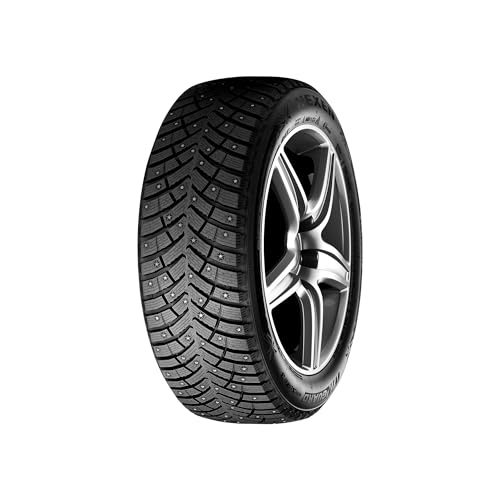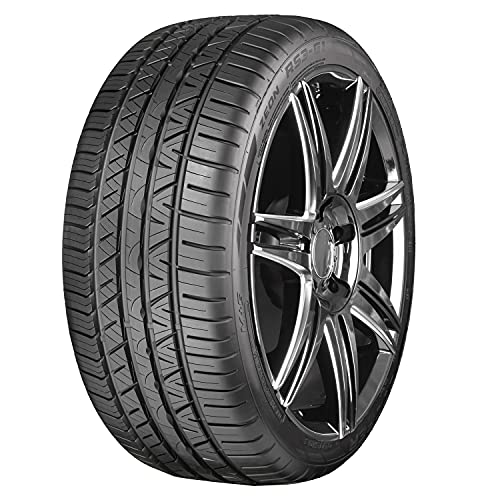10 Best Snow Tires [2025]
This post contains affiliate links. As an Amazon Associate, we earn from qualifying purchases.
Finding the best snow tires for your vehicle can be a daunting task, especially with the multitude of options available on the market, each promising superior performance in winter conditions. To simplify this process, we meticulously researched and shortlisted 10 top-rated products based on expert reviews, user feedback, and performance tests. Our curated list aims to save you time and hassle, guiding you directly to the best snow tires that meet your specific needs and ensure safety on icy roads.
Top 10 Snow Tires In The Market
Snow Tires Review
- Built with a directional tread pattern that enhances grip and traction in deep snow
- Features an optimized distribution of up to 140 stud pin holes that improve traction and reduce braking distances on icy roads when pinned with studs
- Wide tread grooves force water, slush, and ice out of the tire to reduce the risk of hydroplaning
- A high-grip silica rubber compound boosts traction in lower temperatures, ice, slush, and snow while also promoting a longer tread life
- Tread pattern is computer tuned to reduce road noises and vibrations
- Fit Type: Vehicle Specific
- Load Capacity: 1356.0
- Covered by Nexen's best-in-class Total Coverage Warranty, which includes 36 months of Roadside Assistance
- Optional TSMI #12 studs for superior grip and control in snow and ice
- Directional tread pattern with deep grooves for quick evacuation of water and slush from the tread
- Dense siping for extra road bite for enhanced grip and control in extreme weather conditions
- Three-Peak Mountain Snowflake (3PMSF) certified for great ice and snow performance
- Fit Type: Vehicle Specific
- All-Season Premium Performance Tire
- Our best, most advanced all-season high performance tire
- Designed for owners of performance vehicles that drive year round
- Exceptional grip and handling
- Enhanced stability and durability
- Treadlife: N/A
- Tire Only
- Season: Winter, Performance: Touring
- Car Type: Truck/SUV
- Load Range XL, 4-Ply Rated, 4-PR
- A Leader In Control On Ice
- Confident Stopping Power On Snow And Ice
- Reliable Handling In Winter Conditions
- Bit Particles For Impressive Traction On Ice
- Fit type: Vehicle Specific
- Certified with the RMA 3PMSF symbol for severe snow performance, the versatile Ice Edge has been specially engineered to meet the needs of users in a variety of winter driving environments. This tire is loaded with design features that specifically target the unique demands of cold weather driving, such as a specially formulated tread compound tuned to superior performance in low temperatures and Sumitomos unique 3D sipe technology that provides the ultimate bite on snow and ice
- Wide and Serrated tread channels enhances snow grip and speeds evacuation of slush and ice
- Optimized 3D serrated siping pattern maximizes tread bite on winter road surfaces
- Triangular Center tread blocks expands tread contact footprint with road surface for superior stability and handling
- Optimized Stud Pin distribution for the maximum performance capability when studded for winter use
- Built to Keep You Working Through the Winter
- Winter Performance and Grip You Can Rely On
- Long-Lasting Performance
- Great Value
- Fit type: Vehicle Specific
Our Review Process
To ensure you get reliable product recommendations, we follow a detailed review methodology that includes:
- Market Research: Scanning best-selling and trending products in this category.
- User Feedback: Reviewing customer reviews, star ratings, and complaints.
- Hands-On Testing: Trying select products ourselves when feasible.
- Feature Comparison: Evaluating specs, durability, pricing, and safety.
- Expert Opinions: Consulting with niche experts or credible reviewers.
We independently select the top 10 options based on value, quality, and usability. To learn more, visit our detailed review process.
Key Considerations Before Buying Snow Tires
1. Understand Your Driving Needs
Before purchasing snow tires, consider your driving habits. Do you primarily drive in the city, or do you often find yourself on rural roads? The type of terrain and typical weather conditions you encounter can significantly influence the type of snow tires needed.
2. Tire Type: Studded vs. Studless
Snow tires come in two main types: studded and studless. Studded tires provide better traction on icy surfaces, while studless tires excel in snowy conditions and offer better performance on dry roads. Assess your local climate and road conditions to choose the appropriate type.
3. Tire Size and Compatibility
Ensure that the snow tires you consider are compatible with your vehicle. Check your owner’s manual or the placard on the driver’s door jamb for the correct tire size specifications. Choosing the right size is crucial for performance and safety.
4. Tread Design
The tread pattern of snow tires plays a vital role in their performance. Look for tires with deep grooves and wide channels that can effectively expel snow and slush. The design should also include biting edges to enhance traction on icy surfaces.
5. Performance Ratings
All-season tires may not provide the same level of performance as dedicated snow tires. Look for the snowflake symbol on tire sidewalls, which indicates that the tire meets specific performance criteria in winter conditions.
6. Brand and Quality
Investing in reputable brands known for quality can make a significant difference in performance and safety. Research customer reviews and expert opinions on various brands to identify those that are highly rated for snow performance.
7. Price and Budget
Setting a budget for your snow tire purchase is essential. While it’s tempting to opt for the cheapest option, remember that investing in high-quality tires can provide better performance and potentially save you money in the long run through reduced wear and tear.
8. Seasonal Considerations
Consider how long you will need the snow tires. If you live in an area with long winters, durable tires with a longer tread life may be worth the investment. Conversely, if winters are short, you might not need to spend as much on high-end models.
9. Professional Installation
Proper installation and balancing of snow tires are crucial for optimal performance. Consider the costs associated with professional installation and maintenance, as well as the potential need for regular rotations during the winter season.
10. Storage Options
If you plan to switch between winter and summer tires, think about how you’ll store the tires when they’re not in use. Proper storage can extend the life of your tires and maintain their performance when needed.
FAQs
What are snow tires?
Snow tires, also known as winter tires, are specially designed tires that provide improved traction, handling, and performance in cold weather conditions, particularly on snow and ice. They have unique tread patterns and rubber compounds that remain flexible in low temperatures, offering better grip compared to all-season tires.
When should I put on snow tires?
It is generally recommended to install snow tires when temperatures consistently drop below 7°C (45°F). This is typically in late fall or early winter, depending on your location. It’s best to switch to snow tires before the first significant snowfall to ensure optimal safety and performance.
Do I need to replace all four tires with snow tires?
Yes, it is recommended to install snow tires on all four wheels to maintain balanced handling and traction. Installing them only on the front or rear can create an imbalance, which may lead to handling issues and increase the risk of losing control of the vehicle.
Can I use snow tires all year round?
While snow tires can technically be used year-round, it is not advisable. Snow tires are made from softer rubber compounds that can wear out quickly in warmer temperatures, and their tread patterns are optimized for snow and ice, which can lead to decreased performance and safety on dry or wet roads.
How long do snow tires last?
The lifespan of snow tires varies depending on factors such as driving habits, road conditions, and tire maintenance. On average, snow tires can last anywhere from three to five seasons. However, it’s important to check the tread depth regularly and replace them if they become worn or if the tread depth falls below 4/32 of an inch.
What is the difference between snow tires and all-season tires?
Snow tires are specifically designed for winter conditions, with unique tread patterns and rubber compounds that provide better traction on snow and ice. All-season tires, on the other hand, are designed to perform adequately in a variety of conditions but do not offer the same level of grip and performance in severe winter weather as snow tires do.
How do I know if my snow tires are worn out?
You can check the tread depth of your snow tires using a tread depth gauge or the penny test. If the tread depth is below 4/32 of an inch, it’s time to consider replacing your snow tires. Additionally, look for uneven wear, sidewall damage, or other signs of damage that could compromise performance.
Are snow tires more expensive than regular tires?
Generally, snow tires can be more expensive than all-season tires due to their specialized design and materials. However, the investment is often justified by the enhanced safety and performance they provide in winter conditions, potentially preventing accidents and providing peace of mind during harsh weather.
Can I mix snow tires with different brands or models?
It is not recommended to mix different brands or models of snow tires on the same vehicle, as this can lead to uneven handling and performance. For optimal safety and performance, it is best to use a matched set of snow tires that are of the same brand, model, and size.
The Bottom Line
In conclusion, selecting the right snow tires can significantly enhance your vehicle’s performance and safety during the harsh winter months. The ten products featured in our article were meticulously chosen based on a combination of expert reviews, user feedback, performance testing, and value for money. Each tire on our list has proven to excel in various conditions, from deep snow to icy roads, ensuring that you can drive with confidence no matter the weather. Our commitment to providing comprehensive and unbiased evaluations allows you to make an informed decision tailored to your specific driving needs.
By following our curated list, you can save time and effort in your search for the best snow tires. Whether you’re an everyday commuter, an adventurous explorer, or someone who simply wants to ensure safety for your family, investing in quality winter tires is essential. With the right choice, you can improve traction, reduce the risk of accidents, and navigate winter roads with ease. So gear up with the right snow tires and embrace the winter season, knowing you’re prepared for whatever the elements throw your way.








